History
Cardland, as the first event came to be known in 1999, happened spontaneously. Free sample packs of cards were given to attendees. A couple of people began to build little towers out of cards while waiting for one of their friends to finish a game. A sign was left out "Add on if you wish, but do not destroy." Soon other convention attendees began adding onto the project. As that Friday night progressed more and more was added on including bridges and tall towers. Roads connected structures, and buildings of all types came about. Soon encompassing 20 tables, both above and below, a city and its suburbs were formed, one of which became known as Cardhalla. The name stuck and the next year, 2000, Cardhalla became an official event of Gen Con, and was designated space within the tournament hall.
A large portion of the cards donated to the original Cardhalla were the giveaways included in every attendee's bag, such as cards from the Monty Python and the Holy Grail card game and various promotional cards. When possible, each building was designed with cards from a similar game or license. (Such as Star Trek, Star Wars, Netrunner and Rage)
Since then, the event has raised nearly $2000 for charity and given people an opportunity to do something with their spare time at the convention.
In 2006 the first offshoot of this event was seen at Phoenix ConGames where 30,000 cards were used to build, donate, and destroy. Over 1000 cards were taken from the GenCon 2005 event and used to seed Phoenix ConGames 2006. The money raised ($276.00) at Phoenix ConGames was donated to a local orphanage.
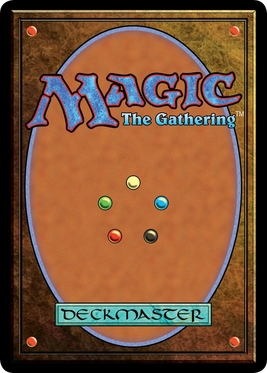
Magic: The Gathering is a tabletop and digital collectable card game created by Richard Garfield. Released in 1993 by Wizards of the Coast, Magic was the first trading card game and had approximately thirty-five million players as of December 2018, and over twenty billion Magic cards were produced in the period from 2008 to 2016, during which time it grew in popularity.

An ace is a playing card, die or domino with a single pip. In the standard French deck, an ace has a single suit symbol located in the middle of the card, sometimes large and decorated, especially in the case of the ace of spades. This embellishment on the ace of spades started when King James VI of Scotland and I of England required an insignia of the printing house to be printed on the ace of spades. This insignia was necessary for identifying the printing house and stamping it as having paid the new stamp tax. Although this requirement was abolished in 1960, the tradition has been kept by many card makers. In other countries the stamp and embellishments are usually found on ace cards; clubs in France, diamonds in Russia, and hearts in Genoa because they have the most blank space.
Gen Con is the largest tabletop game convention in North America by both attendance and number of events. It features traditional pen-and-paper, board, and card games, including role-playing games, miniatures wargames, live action role-playing games, collectible card games, and strategy games. Gen Con also features computer games. Attendees engage in a variety of tournament and interactive game sessions. In 2019, Gen Con had nearly 70,000 unique attendees.
Spite and Malice, also known as Cat and Mouse, is a relatively modern American card game for two or more players. It is a reworking of the late 19th century Continental game Crapette, also known as Russian Bank, and is a form of competitive solitaire, with a number of variations that can be played with two or three regular decks of cards.
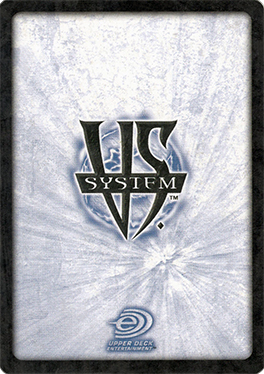
Vs. System, also written as VS System and abbreviated as VS, is a collectible card game designed by Upper Deck Entertainment (UDE). In the game, players build and play a deck of Vs. System cards in an attempt to win a game against their opponent. It was first published in 2004 and is set in the superhero genre. The game was discontinued by Upper Deck Entertainment in January 2009.
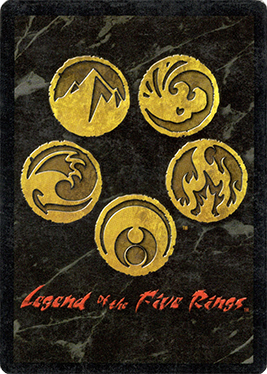
Legend of the Five Rings (L5R) is an out-of-print collectible card game created by a joint venture featuring Alderac Entertainment Group and ISOMEDIA in 1995 and published until 2015, when it was announced that the game would be discontinued for a rules-incompatible successor that will be part of Fantasy Flight Games' Living Card Game line. L5R takes place in the fictional empire of Rokugan from the Legend of the Five Rings setting, where several clans and factions vie for domination over the empire.
A gaming convention is a gathering centered on role-playing games, collectible card games, miniatures wargames, board games, video games, or other types of games. These conventions are typically two or three business days long, and often held at either a university or in a convention center hotel.

The World of Warcraft Trading Card Game is an out-of-print collectible card game based on Blizzard Entertainment's MMORPG, World of Warcraft. The game was announced by Upper Deck Entertainment on August 18, 2005 and released on October 25, 2006. Players can play against each other one-on-one, or can join others in order to defeat dungeon/raid "bosses" based on those in the MMORPG. In March 2010, Upper Deck lost the license from Blizzard Entertainment. The license was acquired by Cryptozoic Entertainment later in the month, with the company announcing that planned card sets would be released.
StarCraft: The Board Game, published by Fantasy Flight Games, is a game inspired by the 1998 computer game StarCraft. Players take control of the three distinctive races featured in the video games, the Terrans, the Protoss, or the Zerg, to engage in battle across multiple worlds in order to achieve victory. Each of the three races features a fairly different playing style. A prototype of the game was shown in BlizzCon 2007, with pre-release copies sold at Gen Con 2007 and Penny Arcade Expo 2007. It was publicly released in October 2007.

The Spoils is a collectible card game created by Tenacious Games and owned by Arcane Tinmen since January 2009. It launched with a free open beta in August 2006, and officially released for sale in November 2006. The Spoils was in development from 2001 to 2006. The design team is headed up by Josh Lytle, who also designed the collectible card game Magi-Nation Duel. Jon Finkel, a prominent player in Magic: the Gathering's Pro Tour, aided the development team as an advisor since 2002. The Spoils Card Game, while under the design direction of Ken Pilcher, won the Fan Favorite Origins Award for Best Collectible Card Game at the 2015 Origins Game Fair, beating other contenders including Legend of the Five Rings and Magic: The Gathering.

The X-Files Collectible Card Game is an out-of-print collectible card game based on The X-Files fictional universe. The game was developed by NXT Games and published by the US Playing Card Company (USPCC) in 1996. The game was canceled in early 1998.
Eve: The Second Genesis is an out-of-print collectible card game set in the universe created for the online game Eve Online. Each player represents the CEO of a corporation, aligned with a particular race, and through exploration, mining, and military strength, their goal is to defeat their opponent CEOs.

Chaotic is an out-of-print Danish collectible card game brought to the United States by Chaotic USA and 4Kids Entertainment, and distributed by TC Digital Games. It was released along with the open beta version of the online game on October 24, 2007. The card game is also featured in the animated series of the same name. As of 2014, the website is currently closed and the cards are no longer in production.
The rules of Magic: The Gathering were originally developed by the game's creator, Richard Garfield, and accompanied the first version of the game in 1993. The rules of Magic have been changed frequently over the years by the manufacturer, Wizards of the Coast, mostly in minor ways. However, major rules overhauls have also been done a few times.
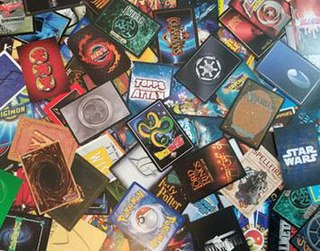
A collectible card game (CCG), also called a trading card game (TCG) among other names, is a type of card game that mixes strategic deck building elements with features of trading cards, introduced with Magic: The Gathering in 1993.
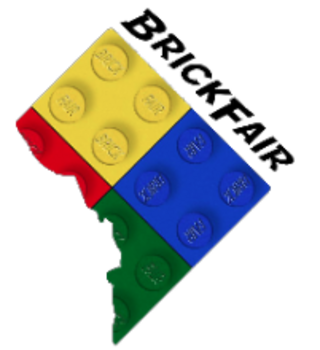
BrickFair is a Lego convention and exhibition held annually in the Eastern United States. It was first held in 2008 at Tysons Corner, Virginia by Todd Webb, and in subsequent years, the flagship Virginia convention has been held in Chantilly, typically during the first weekend of August. BrickFair is a four-day event, operating generally Thursday through Sunday. The convention displays Lego models, displays and trains, most often covering more than 100,000 square feet of convention space. BrickFair conventions are also held in New England and the Southeastern United States, with the advent of BrickFair Alabama in 2012 and BrickFair New England in 2013. BrickFair operates in every season and in four East Coast states. BrickFair is believed to be the largest Lego convention in the United States and one of the largest in the world. The Virginia convention has had up to 22,500 attendees in its public hours.
Star Wars: The Card Game is a Living Card Game (LCG) produced by Fantasy Flight Games. It is a two-player card game set in the Star Wars universe. It puts one player in command of the light side of the Force, and one player in command of the dark side of the Force. The Balance of the Force expansion allows multi-player games. The game is set within the time-frame of the original Star Wars trilogy.
LexiCon Gaming Convention is a tabletop board game focused convention in Lexington, KY, held every spring at the Clarion Hotel and Convention Center. LexiCon features a game library of over 2,000 titles, provided by LexiCon founders, convention supporters, local board game groups and the convention itself.
A roguelike deck-building game is a hybrid genre of video games that combines the nature of deck-building card games with procedural-generated randomness from roguelike games.
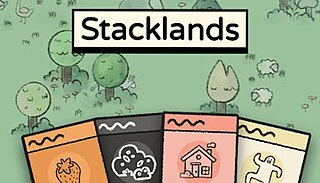
Stacklands is a 2022 card-based simulation video game developed and published by indie developer Sokpop Collective. It was released for Microsoft Windows and macOS on 31 March 2022 and is the group's 90th game. In this village builder, the player stacks cards to craft resources, build structures, and fight creatures.













